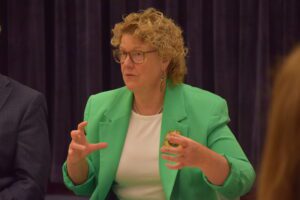Who is a member?
Our members are the local governments of Massachusetts and their elected and appointed leadership.

Climate Chief Melissa Hoffer discusses the new Massachusetts Community Climate Bank during the June 13 meeting of the Local Government Advisory Commission at the State House, just a couple hours after Gov. Maura Healey announced the creation of the program — the nation’s first “green bank” devoted to affordable housing.
Gov. Maura Healey today announced the launch of the first “green bank” in the country dedicated to affordable housing.
She said the Massachusetts Community Climate Bank, seeded with $50 million in state funds from the Department of Environmental Protection, is designed to boost investment in efforts to reduce greenhouse gas emissions from the building sector.
A primary goal is to attract private sector capital and federal funds available under the Inflation Reduction Act to finance building retrofits aligned with the state’s long-term climate objectives, as well as construction of decarbonized buildings.
The governor said the bank will focus on the affordable housing market, where residents bear a disproportionate burden in energy costs and climate impacts, to promote an equitable energy transition and to meet the needs of environmental justice populations. Over time, she said, the bank will diversify investments to include other decarbonization measures that benefit communities.
The climate bank is located within MassHousing, the state’s affordable housing finance and investment bank, and will work in partnership with the Massachusetts Clean Energy Center and MassDevelopment. The governor said the collaboration will ensure that each entity’s capabilities are leveraged to support the identification, development, financing and execution of clean energy projects.
“The Massachusetts Community Climate Bank will be our financial engine for moving forward on our climate goals, relieving the pressure of high housing costs, and creating good jobs and healthier communities,” Healey said. “This first-of-its kind initiative is going to make our state more competitive, affordable and equitable.”
Lt. Gov. Kim Driscoll said the climate bank “can support deep energy retrofits and investments in energy efficiency technologies, eliminating emissions and cutting residents’ energy costs for years to come.”
The administration said the program can help nonprofit developers access capital that makes net-zero development possible, and can help the state rehabilitate and retrofit older affordable housing that’s in need of repair by getting access to new federal climate funds.
Low- to moderate-income residents tend to pay a disproportionate share of their income on energy costs, have less control of their residences, and have fewer resources to invest in measures that will reduce their emissions and control their energy bills. The climate bank expects to provide low-cost capital and innovative deal structures to integrate clean energy and efficient technologies into affordable housing development and preservation and mortgage products for home improvements.
The climate bank will integrate clean energy into MassHousing’s lending for affordable housing, create programs for similar affordable housing projects, and engage capital markets more broadly to invest in affordable housing decarbonization.
The program will finance heat pumps, efficiency upgrades to building envelopes, heat pump water heaters, high-efficiency appliances, and solar panels as a part of the same process as other affordable housing renovation measures.
The climate bank is intended to position Massachusetts to compete for funding from the National Clean Investment Fund under the Inflation Reduction Act and to anchor engagement with other federal finance opportunities, such as the U.S. Department of Energy Loan Program Office.
In Massachusetts, the building sector is responsible for more than a quarter of total greenhouse gas emissions. Unlike cars, buildings last for decades, making the need to retrofit existing buildings especially important to achieve statewide decarbonization goals. According to the 2050 Massachusetts Roadmap report, more than 80% of the buildings that will exist in 2050 are already built.
The state’s Clean Energy and Climate Plan calls for a 49% reduction in greenhouse gas emissions from residential heating by 2030, and a 95% reduction by 2050.
On the first full day of her administration, Healey signed an Executive Order creating an Office of Climate Innovation and Resilience and establishing the cabinet-level position of climate chief, to which she has appointed Melissa Hoffer.